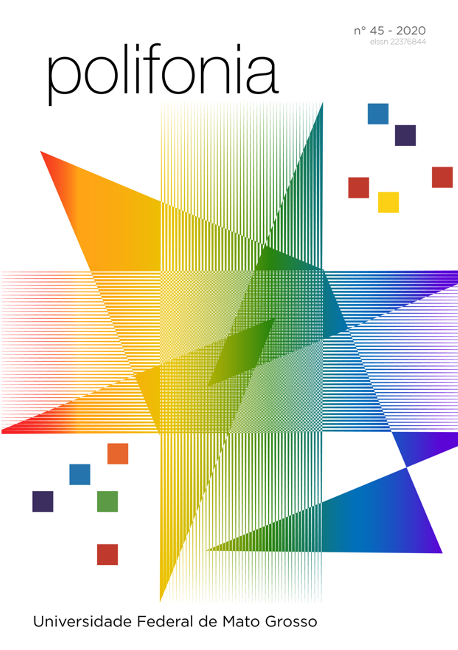The development of undergraduate students’ concepts about the fanfictional genre system
Palavras-chave:
Fanfictional Creative Writing, Sociocultural theory, Case studyResumo
The fanfictional genre has not been extensively investigated in Brazil. In fact, there is very little academic work on this genre in universities (MYERS, 2006, MORLEY, 2007, BLYTHE & SWEET, 2008, HEALEY, 2009 and OBERHOLZER, 2014). Therefore, a Fanfictional Creative Writing in English course (FCWE) was developed and taught at the end of 2016. This course was attended by 5 undergraduate students in Languages and Literatures. Two of the objectives of this course were to 1) identify and 2) develop concepts about fanfictions. For this article, only student A was taken as an example. The methodology applied was the Case Study (DUFF, 2008, 2012; DYSON, 2005; STAKE, 2006). The FCWE course was based on the Vygotskian sociocultural theory (VYGOTSKY, 2004; 2007). As a result, student A demonstrated signs of development regarding social facts, speech acts, genre sets, and genre systems (BAZERMAN, 2012; CURRY & LILLIS, 2016).
Referências
BAZERMAN, C. Speech Acts, Genres, and Activity Systems: How Texts Organize Activity and People. University of California, Santa Barbara, 2012.
BLYTHE, H., & SWEET, H. Why creativity, why now? Tomorrow’s Professor, 2008.
CURRY, M. J.; LILLIS, T. M. Estratégias e táticas na produção do conhecimento acadêmico por pesquisadores multilíngues. In: FIAD, R. S. (Org.). Letramentos acadêmicos: contextos, práticas e percepções. São Carlos: Pedro & João, 2016.
DEW, B. Rewriting Popular Classics as Popular Fiction: Jane Austen, Zombies, Sex and Vampires. The Bloomsbury Introduction to Popular Fiction, 2014.
DUFF, P. How to carry out case study research. In A. Mackey & S. M. Gass (Eds.). Research methods in second language acquisition: A practical guide. New York: Wiley-Blackwell, 2012.
DYSON, A. H. On the case: Approaches to language and literacy research. New York: Teachers College Press and the National Conference on Research in Language and Literacy, 2005.
GENETTE, G. Paratexts: Thresholds of interpretation (J. E. Lewin, Trans.). New York: Cambridge University Press. doi:10.1017/CBO9780511549373, 2005.
HYLAND, K. English for Academic Purposes. An Advanced Resource Book. London: Routledge, 2006.
JAMESON, F. Postmodernism, or, The cultural logic of late capitalism. Duke University Press, 1992.
JENKINS, H. Fans, Bloggers, and Gamers: Exploring Participatory Culture. New York and London: New York University Press, 1992.
______. 2007. Textual Poachers: Television Fans and Participatory Culture. New York: Routledge.
HODGES, R. and KRESS, G. Social Semiotics. Cambridge: Polity, 1998.
KRISTEVA, J. Desire in language: A Semiotic Approach to Language and Art. Trans. Thomas Gora, Alice Jardine and Leon S. Roudiez, ed. Leon S. Roudiez. New York: Columbia University Press, 1980. Print.
LANTOLF, J., Sociocultural Theory and Second Language Development. In B. van Patten & J. Williams (Eds.), Theories in Second Language Acquisition (p. 207-226). New York: Routledge, 2015.
MARCUS, G. A new literary history of America. Belknap Press: An Imprint of Harvard University Press, 2012.
MORLEY, D. The Cambridge Introduction to: Creative Writing. Cambridge University Press, 2007.
MYERS, D.G. The Elephants Teach: Creative Writing Since 1880. New Jersey: Prentice Hall, 2006.
OBERHOLZER, P.W. Student Conceptions of Creative Writing. Masters Research Report, University of the Witwatersrand, 2014.
SERRANO, J. F. M. Critical Digitality: From the Virtual to the Digital. Praxi Filosófica Nueva serie, No. 45 Suplemento, julio-diciembre, 2017.
STAKE, R. E. Multiple case study analysis. New York: Guilford, 2006.
Stuart, I. The Impact of Immediate Feedback on Student Performance. Global Perspectives on Accounting Education, 1, 2004.
VARGAS, M. L. B. O fenômeno fanfiction: novas leituras e escrituras em meio eletrônico. Passo Fundo: UPF, 2005.
TRIFONAS, P. P. Handbook of Cultural Studies and Education. Routledge, 2018.
WATTPAD. Available on <https://www.wattpad.com/>. Accessed on 14/04/2019.
WERTSCH, J. Mind as action. New York: Oxford University Press, 2008.
VYGOTSKY, L. S. Mind in Society: The Development of Higher Psychological Process. Cambridge, Mass: Harvard University Press, 2004.
______. Thought and language. Cambridge, MA: The Massachusetts Institute of Technology, 2007.
WEF. WORLD ECONOMIC FORUM. Industrial Internet of Things: Unleashing the Potential of Connected Products and Services, 2015.


